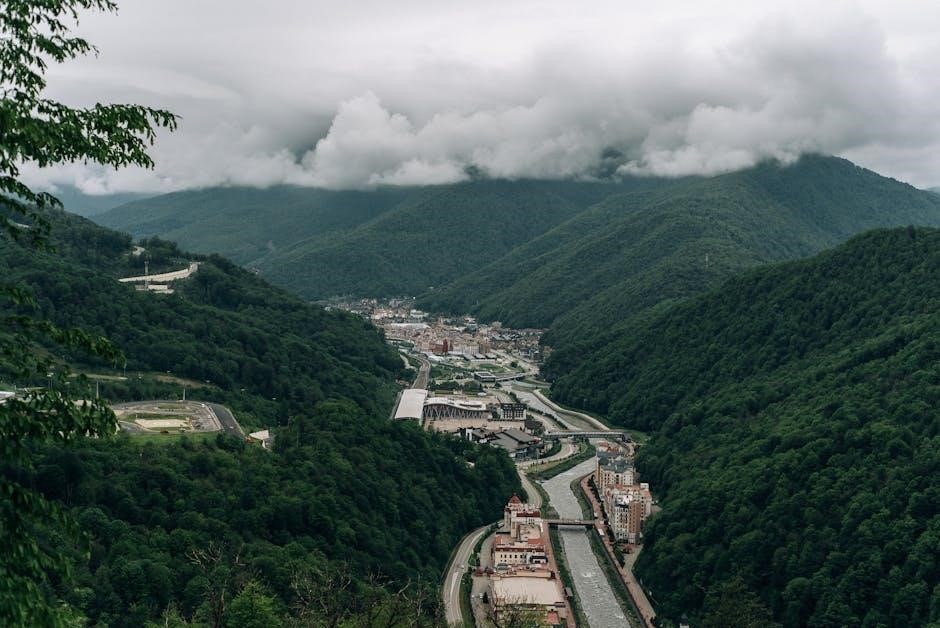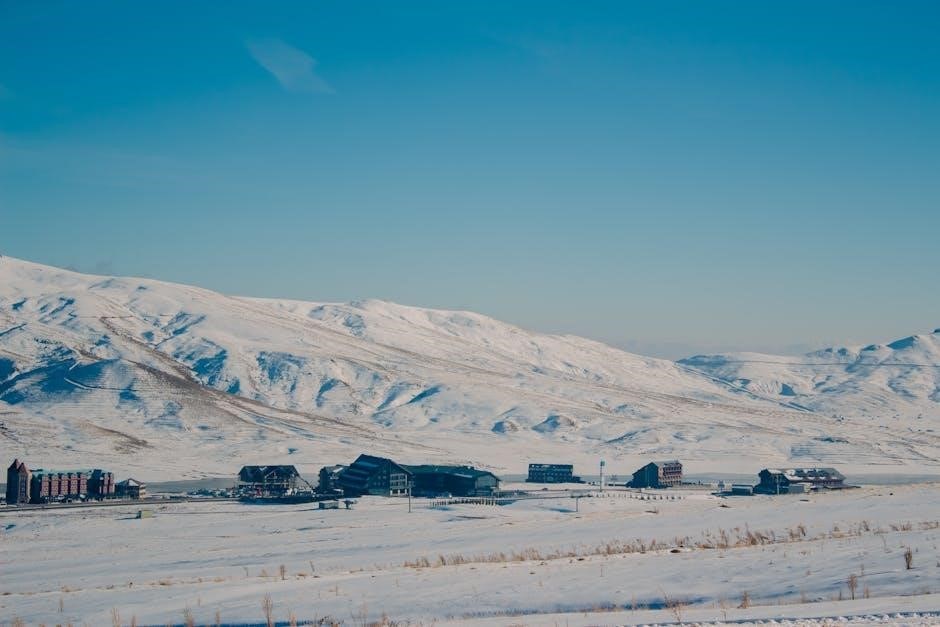
Our Town by Thornton Wilder: A Comprehensive Overview
Thornton Wilder’s “Our Town” is a celebrated American play, frequently performed and studied․ This overview delves into its enduring appeal, exploring themes of life, death, and community․ It earned the Pulitzer Prize, solidifying its place in literary history․
Thornton Wilder (1897-1975) stands as a prominent figure in American literature, celebrated for his novels and plays․ He won three Pulitzer Prizes, showcasing his exceptional talent․ Wilder’s works often explore universal themes of human existence with innovative staging and profound insights․ He is recognized for his unique narrative style․ His play “Our Town” remains his best-known and most performed work․ Wilder’s legacy continues to inspire and influence contemporary writers and theater practitioners․ His contribution to American literature is significant, earning him lasting recognition and admiration․
Wilder’s Literary Achievements
Thornton Wilder’s literary achievements are marked by his versatility and innovation across multiple genres․ He garnered three Pulitzer Prizes, a testament to his exceptional writing skills․ His notable works include the novels “The Bridge of San Luis Rey” and “The Eighth Day,” both celebrated for their profound themes and engaging narratives․ Wilder’s plays, especially “Our Town” and “The Skin of Our Teeth,” showcase his experimental approach to theater․ His unique style and insightful exploration of human experiences have cemented his place as a major figure in American literature․ Wilder’s legacy continues to inspire readers and playwrights alike․
Overview of “Our Town”
“Our Town,” set in Grover’s Corners, New Hampshire, is a play in three acts that explores universal themes․ It delves into daily life, love, marriage, and death within a small community․ The play famously uses minimalist staging, with no curtain and minimal scenery, drawing attention to the characters’ experiences․ The Stage Manager guides the audience through the story, breaking the fourth wall and commenting on the action․ “Our Town” follows the lives of Emily Webb and George Gibbs, portraying their growth and relationships․ It’s a poignant reflection on appreciating the simple moments of life․

Availability of “Our Town” in PDF Format
“Our Town” by Thornton Wilder is readily available in PDF format from various sources․ These include online libraries, educational websites, and platforms offering digital book downloads․
Free PDF Downloads
Numerous websites offer “Our Town” by Thornton Wilder as a free PDF download․ These resources aim to provide accessible versions of the play for students, educators, and theater enthusiasts․ However, it’s essential to verify the legitimacy and quality of the source before downloading to ensure an accurate and complete copy of the script․ Many educational sites and online archives provide reliable free access․ Be mindful of potential copyright issues when obtaining free PDF versions․ Always prioritize reputable sources to avoid unauthorized or altered copies of Wilder’s classic play․
Legitimate Sources for PDF Copies
Finding legitimate PDF copies of Thornton Wilder’s “Our Town” is crucial for academic and performance purposes․ Reputable sources often include university libraries, educational platforms, and publishers’ websites․ These sources ensure the integrity of the text and respect copyright laws․ Project Gutenberg might offer a legal free version if the play’s copyright has expired in your region․ Always check the source’s credentials and usage rights before downloading․ Avoid unofficial websites that may distribute unauthorized or altered versions․ Accessing legitimate PDFs supports the author and ensures accurate study and performance materials․
Accessibility via Apps and Online Platforms
“Our Town” by Thornton Wilder is increasingly accessible through various apps and online platforms, catering to modern readers and students․ Many e-reading apps, like Kindle and Google Play Books, offer digital versions for purchase or rent․ Libraries often provide access to e-books and audiobooks through platforms like OverDrive or Libby․ Some educational websites and drama resources may include the play’s text for study purposes․ Always verify the platform’s legitimacy and the version’s accuracy․ These digital avenues provide convenient ways to engage with Wilder’s classic, enhancing its reach and educational impact․

Themes and Characters in “Our Town”
“Our Town” explores universal themes of life, love, and death through relatable characters․ The play portrays everyday experiences in a small town, reflecting on the beauty and fragility of human existence․
Thematic Exploration
“Our Town” delves into profound themes centered around appreciating the mundane aspects of daily life and the significance of human connection․ It explores the cyclical nature of life, encompassing birth, love, marriage, and death within the microcosm of Grover’s Corners․ Wilder encourages audiences to contemplate their own existence and to cherish fleeting moments often taken for granted․ The play underscores the importance of community, memory, and the enduring power of love as fundamental components of the human experience․ It prompts reflection on how we realize and value life․
Character Analysis: Emily Webb and George Gibbs
Emily Webb embodies youthful curiosity and a deep appreciation for life’s simple joys, evolving from an inquisitive schoolgirl to a reflective young woman․ George Gibbs, initially portrayed as an average boy with baseball aspirations, matures into a responsible and loving husband․ Their relationship symbolizes the universal experiences of love, marriage, and the challenges of navigating life’s complexities․ Emily’s poignant return to life after death highlights her profound realization of the beauty in everyday moments․ George’s grief and eventual acceptance demonstrate the resilience of the human spirit in the face of loss․
The Role of the Stage Manager
The Stage Manager in “Our Town” serves as a narrator, commentator, and guide, breaking the fourth wall to directly address the audience and provide context․ He controls the play’s pace, introduces characters, and offers philosophical insights into the events unfolding in Grover’s Corners․ His omniscient perspective allows him to comment on the significance of ordinary moments and the cyclical nature of life and death․ He also plays minor roles, stepping into the action to further illustrate the town’s history and community․ The Stage Manager’s presence is crucial to the play’s unique structure and thematic exploration․


Setting and Historical Context
“Our Town” is set in Grover’s Corners, New Hampshire, in the early 20th century․ This setting reflects small-town America, exploring themes of community, family, and the passage of time against a backdrop of social change․
Grover’s Corners, New Hampshire
Grover’s Corners, New Hampshire, serves as the quintessential small American town in Thornton Wilder’s “Our Town․” The setting is deliberately simple, with minimal scenery, allowing the audience to focus on the lives of its inhabitants․ The play vividly portrays the gradual changes occurring in the town, from the increasing rarity of horses to the arrival of Ford cars․ This depiction captures the essence of early 20th-century small-town life, emphasizing community and the everyday experiences of its residents․ The town’s Main Street and railway station further establish its identity․
Early 20th Century America
“Our Town” provides a snapshot of early 20th-century America, reflecting the social and cultural shifts of the time․ The play subtly incorporates these changes into the daily lives of Grover’s Corners residents, such as the transition from horse-drawn carriages to automobiles․ Wilder captures the essence of small-town values and the simplicity of life before modernization fully took hold․ The play offers a nostalgic glimpse into a bygone era, emphasizing community bonds and the importance of appreciating everyday moments․ It underlines the gradual evolution of American society during this period․
Social Commentary
Wilder’s “Our Town” subtly incorporates social commentary, prompting audiences to reflect on their own lives․ The play encourages a deeper appreciation for the seemingly mundane aspects of existence․ By contrasting the living world with the afterlife, Wilder highlights the transient nature of human experience․ The absence of elaborate scenery forces the audience to focus on the characters and their interactions, emphasizing the importance of human connections over material possessions․ The play prompts reflection on the rapid pace of modernization and the potential loss of community values in contemporary society․

Critical Reception and Legacy
“Our Town” achieved immediate acclaim, securing the Pulitzer Prize․ Its enduring popularity is evident in frequent performances․ Brooks Atkinson’s review praised its profound exploration of life’s simple moments, a testament to its lasting impact․
Pulitzer Prize Recognition
The Pulitzer Prize awarded to “Our Town” in 1938 solidified its position as a significant work in American drama․ This prestigious recognition underscored the play’s innovative approach to storytelling and its profound exploration of universal themes․ The award further cemented Thornton Wilder’s reputation as a leading playwright, acknowledging his contribution to the theatrical landscape․ The play’s ability to resonate with audiences and critics alike contributed to its enduring legacy, ensuring its continued presence in theaters and classrooms for generations․ The Pulitzer Prize remains a testament to the play’s artistic merit․
Enduring Popularity and Performances
“Our Town” maintains remarkable popularity, evidenced by its consistent presence in theatrical productions worldwide․ Its simple staging and universal themes contribute to its accessibility, making it a favorite for community theaters and professional companies alike․ The play’s ability to resonate across generations ensures its continued performance; Its exploration of life’s fundamental aspects, such as love, loss, and the appreciation of everyday moments, accounts for its enduring appeal․ The minimalist setting allows for diverse interpretations, further contributing to its lasting relevance․ Its emotional depth and relatable characters guarantee its continued success on stage․
Analysis of Brooks Atkinson’s Review
Brooks Atkinson’s initial review of “Our Town” lauded the play’s profound simplicity and its poignant portrayal of small-town life; His critique highlighted Wilder’s innovative approach to theater, particularly the absence of elaborate scenery․ Atkinson recognized the play’s ability to evoke deep emotions through its honest depiction of everyday experiences․ He praised Wilder’s exploration of universal themes, such as the value of human connection․ Atkinson’s review played a significant role in establishing “Our Town” as an American classic, recognizing its groundbreaking theatrical techniques and its enduring relevance to audiences․ His positive assessment cemented the play’s reputation․

Structure and Key Elements of the Play
“Our Town” employs a unique structure, divided into three acts that explore different stages of life․ The play is notable for its minimalist staging, foregoing traditional sets and curtains․
Three Acts Structure
“Our Town” unfolds in a distinctive three-act structure․ Act I, “Daily Life,” introduces Grover’s Corners and its inhabitants․ Act II, “Love and Marriage,” focuses on the budding relationship between Emily and George․ The final act, “Death and Eternity,” explores the themes of mortality and the afterlife, offering a poignant reflection on the value of everyday moments․ This organization allows for a comprehensive exploration of life’s journey․
Absence of Scenery and Curtains
One of the most striking features of “Our Town” is its deliberate lack of traditional scenery and curtains․ Thornton Wilder employed this minimalist approach to emphasize the universality of the play’s themes․ By stripping away the artifice of theatrical presentation, the audience is invited to focus on the characters and their experiences․ This allows for a deeper connection with the story and its message about the beauty and fragility of life․
Use of Minimalist Staging
Building on the absence of scenery, “Our Town” utilizes a minimalist staging approach․ Simple chairs and tables often stand in for specific locations, prompting the audience to use their imagination․ This technique encourages active participation in the storytelling process․ The bare stage focuses attention on the dialogue and interactions between characters․ This stylistic choice reinforces the play’s commentary on appreciating everyday life and the essential human connections․

Educational Resources and Study Guides
For students and educators, numerous resources exist for studying “Our Town․” These include reading responses, study aids, and dramaturgy resources․ These materials help analyze themes, characters, and the play’s historical context․
Reading Responses and Study Aids
To enhance comprehension and engagement with “Our Town,” various reading responses and study aids are available․ These resources often include chapter summaries, character analyses, and thematic explorations․ Students can utilize these tools to delve deeper into Wilder’s work, examining the play’s structure and symbolism․ Furthermore, study guides may provide critical essays and historical context, fostering a richer understanding․ These aids facilitate classroom discussions and individual study, promoting a more nuanced appreciation of the play’s enduring themes and significance․ Ultimately, they serve as invaluable companions for anyone seeking to explore the depths of “Our Town․”
Dramaturgy Resources
For those involved in producing or deeply analyzing “Our Town,” dramaturgy resources offer invaluable insights․ These materials delve into the play’s historical background, exploring the social and cultural context of early 20th-century America․ Dramaturgy resources may also include character analyses, directorial interpretations, and design considerations․ They often examine the play’s structure, themes, and symbolism, providing a comprehensive understanding for actors, directors, and designers․ By consulting these resources, production teams can create informed and compelling interpretations of Wilder’s masterpiece․ Furthermore, they can enhance the audience’s appreciation of the play’s enduring relevance and artistic merit, contributing to a richer theatrical experience for all involved․
Classroom Adaptations and Activities
“Our Town” lends itself wonderfully to classroom adaptations and activities due to its simple staging and universal themes․ Teachers can utilize the play to explore concepts like community, time, and the appreciation of everyday life․ Activities might include scene work, character analysis essays, and discussions on the play’s historical context․ Students could also adapt scenes to modern settings, fostering creativity and critical thinking․ Staging simplified versions of the play encourages collaboration and performance skills․ Furthermore, analyzing the dialogue and minimalist staging provides opportunities to discuss literary devices and theatrical techniques․ “Our Town” remains a relevant and engaging text for students to explore․

Chronology and Historical Information
Understanding the chronology of Thornton Wilder’s life and the historical context of “Our Town” enriches the play’s interpretation․ Key events and dates surrounding the play’s creation provide valuable insights into its themes and social commentary․
Wilder’s Chronology
Thornton Wilder (1897-1975) was an American writer known for winning three Pulitzer Prizes․ His significant works include the novels “The Bridge of San Luis Rey” and “The Eighth Day,” alongside the plays “Our Town” and “The Skin of Our Teeth․” Examining his life events offers deeper insights․ This includes the production of “Our Town” in 1938, its Pulitzer Prize win, and his overall contribution to American literature, which provides context for understanding his artistic vision․
Historical Context of the Play
“Our Town” is set in early 20th-century America, specifically in Grover’s Corners, New Hampshire․ The play captures gradual changes in society, such as the increasing rarity of horses and the arrival of Ford cars․ It also reflects evolving social norms, including a growing need to lock house doors at night․ Understanding this era enhances appreciation for Wilder’s portrayal of small-town life․ Wilder uses this setting to explore universal themes within a specific time and place․
Key Events and Dates
“Our Town” premiered in 1938, marking a significant event in American theater․ The play is set on May 7, 1901, providing a specific historical anchor․ Wilder won the Pulitzer Prize for Drama in 1938 for “Our Town,” further cementing its legacy․ The play spans several years, capturing the lives of characters from childhood to adulthood and beyond․ These dates and events offer a framework for understanding the play’s themes and historical context, enriching the audience’s experience and appreciation of Wilder’s work․

Performance Information and Production Details
“Our Town” has a rich performance history, with numerous interpretations across various stages․ This section explores directorial choices, notable performances, and the enduring appeal that makes it a frequently produced play․
Production History
“Our Town” premiered in 1938, quickly gaining recognition and becoming a staple in American theatre․ Its minimalist staging and universal themes have made it adaptable for various productions, from Broadway to community theatres․ Its initial success was cemented by winning the Pulitzer Prize․ The play’s enduring popularity has led to countless revivals and adaptations, each bringing a fresh perspective to Wilder’s poignant story of life in Grover’s Corners․ It continues to resonate with audiences, making it a cornerstone of American dramatic literature․
Directorial Interpretations
The open nature of “Our Town,” with its lack of scenery, allows for diverse directorial interpretations․ Some directors emphasize the play’s universality, focusing on the cyclical nature of life․ Others highlight the social commentary, exploring themes of community and change․ The Stage Manager’s role is also subject to varying interpretations, ranging from a detached narrator to a more involved observer․ Directors also make choices about casting, setting, and costume that impact the play’s overall message․ These diverse approaches demonstrate the play’s adaptability and enduring relevance․
Notable Performances
Throughout its history, “Our Town” has seen numerous notable performances, each bringing a unique perspective to the play․ Celebrated actors have taken on the roles of Emily and George, imbuing them with fresh emotional depth․ The Stage Manager, a pivotal character, has been portrayed by actors known for their gravitas and stage presence․ Some performances have emphasized the play’s minimalist aesthetic, while others have incorporated more elaborate staging․ These various interpretations contribute to the play’s rich performance history, showcasing its adaptability and enduring appeal for both actors and audiences․